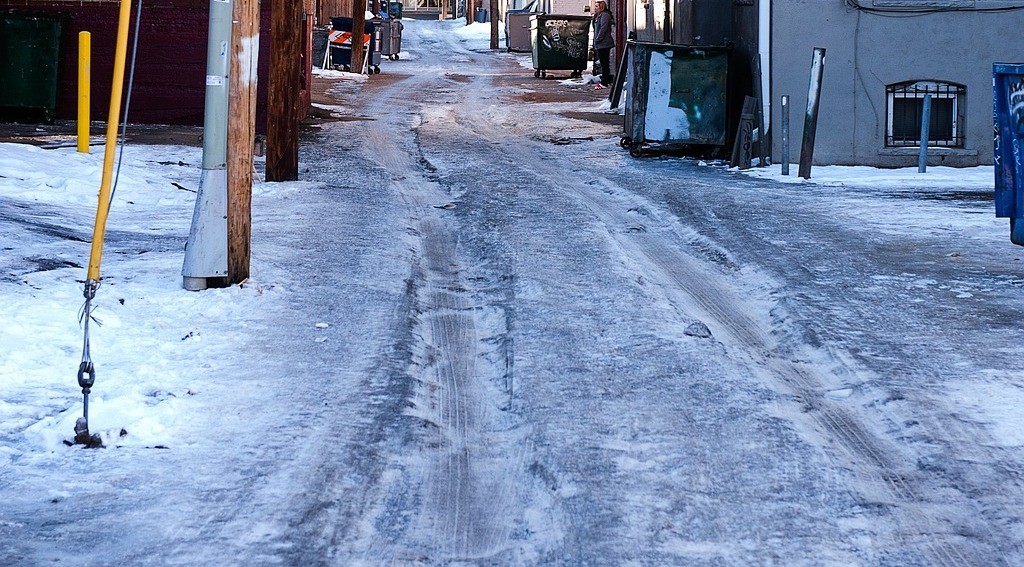Because so many paving companies are seasonal and close during the colder months, people often ask whether laying asphalt in cold weather is possible. The question may arise for a few reasons. First of all, cold weather is one of the biggest factors in pavement deterioration because of the freeze-thaw cycle (read our article on how potholes form). So, perhaps your asphalt driveway or parking lot has suddenly started showing serious signs of wear and needs repair or replacement - but it's Winter and you're unsure if you'll have to wait several months for warmer weather. A second reason this question tends to come up has to do with the seasonality of the paving industry - because asphalt & concrete contractors tend to do most of their work in the warm Summer months, they also tend to be the most busy and hard to book during those months. So, naturally some people wonder if they might be able to beat the mad rush and find a contractor during the off season. So what answer do we give to this question? "It depends". Let's dive into the ins-and-outs of asphalt paving in cold weather.
Paving Asphalt In The Winter: Can You Do It?
We say "it depends" because there are a couple key factors that impact whether or not you should pave, and more importantly when you should pave if you're going to do it during Winter months. Those factors include temperature and precipitation - with temperature being the most important.
How Temperature Affects Asphalt
Cold temperatures make asphalt much harder to work with - if the temperature is lower than mid-50s the asphalt will not only be hard to mix, but getting it to set and cure properly will also be quite difficult. Especially if the ground is frozen, you're going to have issues paving and are likely to end up with a lower quality surface that may need additional work immediately or very soon.
As you likely guessed, a region's climate has a major impact on the paving industry. Parts of the country that don't get as much of a winter likely have no issue paving year-round, whereas Northern parts of the country with intense winters likely have to shut down paving projects entirely during the Winter. Denver hovers somewhere in the middle - we have periods of time during the Winter season that are quite cold, where the ground freezes and temperatures don't rise above 40 or 50 degrees for many days. On the flip side, we'll also see periods of time where it warms up for a number of days, the sun thaws the ground and we get a brief break from the freeze.
For this reason, paving asphalt in the Winter means keeping a very close eye on the weather and planning accordingly. You'll ideally need a period of several days where the temperature rises above 55 degrees and doesn't dip below freezing at night so that you have consistently high enough temps to mix, set and cure the asphalt.
So, the short answer to this question is that yes, you can do asphalt in the Winter BUT you should wait until you see the right temperature conditions - the ground isn't frozen, average temperatures are above freezing and highs are 55+, and there aren't huge temperature fluctuations in the forecast.
How Precipitation Affects Asphalt
While precipitation is less of a concern specific to winter paving and more of a general concern overall with asphalt, it's still a good thing to consider when planning a paving project in cold weather. Obviously, if it's cold enough for snow, sleet or ice, it's likely too cold for asphalt. But, even in warmer temperatures, too much precipitation can disrupt the setting and curing process of asphalt and can also cause the surface temperature to drop more easily. If there's precipitation in the forecast, it's likely best to find another time to pave.
Use-Case of Cold-Mix Asphalt
Another option for asphalt repair in the colder months is cold-mix asphalt. Most paving projects utilize hot-mix asphalt - this type of asphalt can be paved and therefore is necessary for full projects like a full driveway or parking lot - but are harder to do in Winter months because of the impact of cold temperatures. However, while cold-mix asphalt won't do the trick for a full paving project, it can be used for smaller repairs and maintenance such as pothole repair and is easier to do in cold weather than hot-mix.
Conclusion
So, can you do asphalt in the Winter? The final short, wrap-up answer is "yes, BUT..." you need to plan it around ensuring proper temperatures and lack of precipitation. The impact of the local climate is yet another reason we always recommend hiring a local asphalt company - a local paving contractor will be familiar with the weather in the area and how it impacts the work that they do. Lucky for you, the experts at High Quality Asphalt & Concrete stay open all Winter. If you're considering paving asphalt this Winter, get in touch today to discuss your project and the best way to approach it in the colder months.
We also often hear a similar question regarding concrete - read our article addressing the question of "Can You Pour Concrete in the Winter?".
